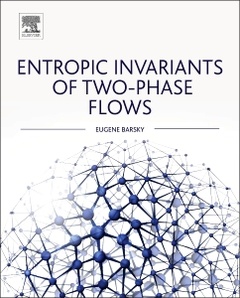Description
Entropic Invariants of Two-Phase Flows
Author: Barsky Eugene
Language: English
Subjects for Entropic Invariants of Two-Phase Flows:
Keywords
Adequacy; Affinity; Affinization invariant; Approximation; Binary mixture; Cascade; Coarseness; Collisions; Collisions cross-section; Composition; Computation; Determinism; Dimensionality; Distribution; Distribution coefficient; Drag; Dynamic entropy; Efficiency; Ensemble; Ensemble of systems; Entropy; Equilibrium; Extraction; Extremum; Flow; Fluctuation; Hamiltonian; Heat capacity; Hovering velocity; Invariant; Laminarity; Mass flow; Matrix; Maximal effect; Maximal entropy; Mobility; Mobility; Model; Modeling; Multicomponent mixture; Paradox; Particles interaction; Precipitation; Probability; Probability density; Productivity; Proportionality; Random walk; Recycle; Reynolds and Archimedes criteria; Separation; Separation efficiency; Separation factor; Separator; Series; Similarity criterion; Stability; Statistical system; Surface roughness; Technological process; Terminal velocity; Thermodynamics; Turbulence; Uncertainty; Universality; Velocity profile; Viscous sublayer; affinity; alance; chaotizing factor; ensemble; entropy; lifting factor; phase space; statistical system
266 p. · 19x23.3 cm · Hardback
Description
/li>Contents
/li>Readership
/li>Biography
/li>Comment
/li>
In this book, a new approach to the theory and practice of two-phase systems based on a global invariant ? entropy, ? and other invariants is formulated and experimentally confirmed.
Chapter I. Modern conceptions of thermodynamic entropyChapter II. Invariants for continuous flowsChapter III. Modern notions of two-phase flows.Chapter IV. Empirical invariants for two-phase flowsChapter V. Entropy of mixture compositionChapter VI. Two-phase flow as a statistical systemChapter VII. Main statistical parameters of a two-phase flowChapter VIII. Substantiation of statistical parameters of mass transfer in two-phase flowsChapter IX. Specific properties of entropy of two-phase flowsChapter X. Invariants for separation curvesChapter XI. Basic physics of cascade separationChapter XII. Application of the obtained results
Students, scientists, engineers engaged in the design and operation of the respective equipment, companies engaged in the production and operation of the respective equipment, mineral technologists, and mining engineers
- Offers a novel approach to the study of the two-phase flows systems based on statistical mechanics and probability theory
- Provides the tools for computing and modelling two-phase systems, predicts mass transfer and enables system optimization
- Provides a plethora of examples in among others, separation processes, dust production, pneumatic transport, and boiling bed




